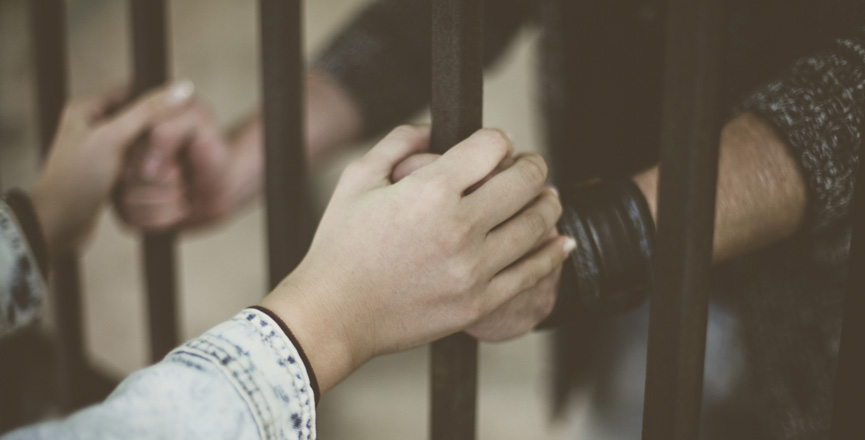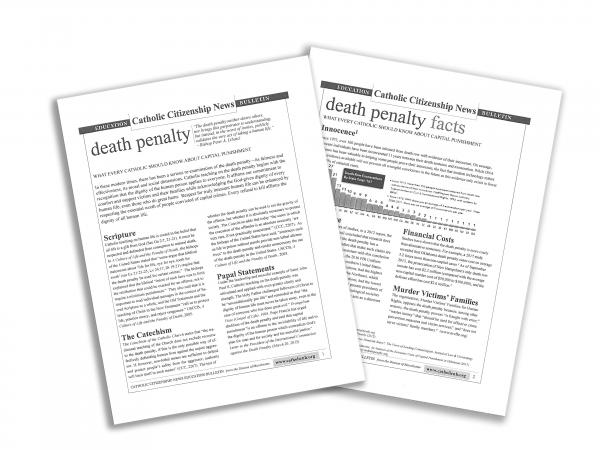
Home » Community » Office of Public Policy » Issues » Death Penalty
Death Penalty
“The death penalty neither deters others, nor brings this perpetrator to understanding, but instead, in the worst of ironies, publicly validates the very act of taking a human life.”
~ Bishop Peter A. Libasci
As Saint John Paul II discussed in his encyclical Evangelium Vitae, human life is a gift given from God, and every human being inherits the dignity of that life. The death penalty is contrary to this belief, as it affords the government the right to determine the time of death for those who have committed certain heinous crimes. While the Church recognizes the historical purpose of the death penalty, it seems that the penalty no longer has a place in modern society.
Although in the past our teaching allowed for capital punishment in rare instances, those rare instances are almost non-existent today in an age of maximum security facilities that protect our communities. The Catechism of the Catholic Church, informed by a heightened sense of the dignity of human life, rehabilitation, and mercy now holds that “the death penalty is inadmissible because it is an attack on the inviolability and dignity of the human person.” (CCC, 2267) As the bishops of the United States have said, “sentences such as life in prison without parole provide non-lethal alternatives” to the death penalty and render unnecessary the use of the death penalty in the United States. USCCB, A Culture of Life and the Penalty of Death, 2005. The Church’s commitment to the dignity of human life extends to all stages and all conditions of human life, even to those convicted of the most serious crimes.
Therefore, the possibility that no other means to deal with the aggressor’s presence could be used is almost inconceivable. In the Holy See’s Declaration to the First World Congress on the Death Penalty, it is stated, “It is surely more necessary than ever that the inalienable dignity of the human life be universally respected and recognized for its immeasurable value. The Holy See has engaged itself in the abolition of capital punishment…and does so in defiance of any assertion of a culture of death.”
New Hampshire repealed the state death penalty on May 30, 2019. Thank you to all those in the Diocese of Manchester who advocated for decades for this effort that stands as a victory for the principle of the value of each human life.
Facts about Death Row:
Over 2,800 inmates are on death row in 35 state and federal prisons. The largest number, over 700, is in California.
Since 1973, there have been over 160 exonerations of death row inmates.
Twenty-three states do not impose the death penalty.
A 2009 poll commissioned by the Death Penalty Information Center found police chiefs ranked the death penalty last among ways to reduce crime. The police chiefs also considered the death penalty to be the least efficient use of taxpayers' money.
(Source: Death Penalty Information Center)
Testimony:
HB 455 – Relative to the Penalty for Capital Murder – February 19, 2019

Educational Bulletin:
What Every Catholic Should Know About the Death Penalty
Read More:
Parish Suggestions to Support Repeal of the Death Penalty
Declaration of the Holy See to the First World Congress on the Death Penalty
USCCB Statements on Death Penalty
Dear Father Kerper: Don’t Murderers Deserve to Die?
Catholic Mobilizing Network to End the Use of the Death Penalty
Faith Catholic: Sister Helen brings Christ to ‘dead men walking’
The teaching of the Church on both legitimate self-defense and the death penalty.
